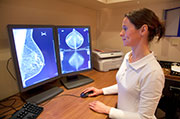- 8 Ways to Increase Dopamine Naturally
- 7 Best Breads for Maintaining Stable Blood Sugar
- Gelatin vs. Collagen: Which is Best for Skin, Nails, and Joints?
- The Long-Term Effects of Daily Turmeric Supplements on Liver Health
- Could Your Grocery Store Meat Be Causing Recurring UTIs?
- Are You Making This Expensive Thermostat Error This Winter?
- Recognizing the Signs of Hypothyroidism
- 10 Strategies to Overcome Insomnia
- Could Artificial Sweeteners Be Aging the Brain Faster?
- Techniques for Soothing Your Nervous System
Obesity, Smoking Might Threaten Implants After Mastectomy


Obesity and smoking increase the risk of implant failure in women who undergo breast reconstruction soon after breast removal, according to a new study.
Researchers analyzed data from nearly 15,000 women, aged 40 to 60, who had immediate reconstruction after breast removal (mastectomy). They found that the risk of implant loss was three times higher in smokers and two to three times higher in obese women.
The more obese a woman, the greater her risk of early implant failure, according to the study, which was published in the December issue of the Journal of the American College of Surgeons.
Other factors associated with a higher risk of implant loss included being older than 55, receiving implants in both breasts, and undergoing both breast removal and reconstruction with implants in a single operation.
“Less than 1 percent of all patients in our study experienced [implant failure],” study lead author Dr. John Fischer, a plastic surgery resident at the Perelman School of Medicine at the University of Pennsylvania, said in a journal news release. “But when we [organized] patients into low-, intermediate- and high-risk groups, the risk went from 0.39 percent to 1.48 percent to 3.86 percent.”
“It may seem like a small difference, but the difference is clinically significant because it means that one in 25 patients in the high-risk group will lose a device within 30 days,” he said.
The researchers also created a risk-scoring tool to help surgeons counsel patients about their predicted risk for early implant loss.
If a patient learns she has a high risk for complications with breast implants, she may choose to have an autologous tissue-based procedure, Fischer said. In autologous breast reconstruction, surgeons create a new breast by using a woman’s own tissue, which is often taken from her abdomen.
“The expectations are better managed and overall satisfaction is likely to be higher,” Fischer said.
More information
The American Cancer Society has more about breast reconstruction after mastectomy.
Source: HealthDay
Copyright © 2026 HealthDay. All rights reserved.










